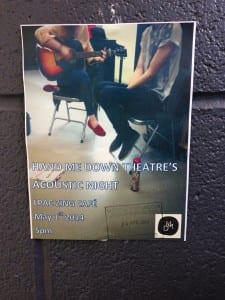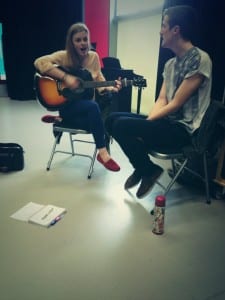Author Archives: Kirsty Jakins
Acoustic Night Success
After advertising the event throughout the University via siren fm, with posters and emails it was finally time for our fundraising event which revealed more about our show and company. We also advertised heavily through social media by giving sneak previews of our musical content to entice people. We bought buckets and added our logo, as well as ordering leaflets for the event. Those who attended and donated also received a sticker of our logo to show their support and bring in potential interest. 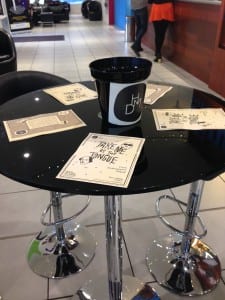
(Above: Acoustic Night Set-Up, taken by Kirsty Jakins)
After the whole company set up the event like you can see above, our audience began to arrive. We introduced the event to reveal more about 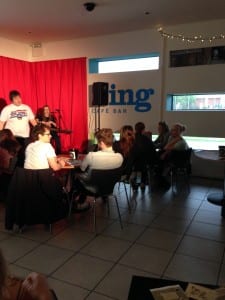 our show, and ensured all knew the box office was open until 6 so if they liked what they saw, tickets could be purchased! Then it was time for the event to begin. Those who were not performing advertised our stickers and let people know what the event was all about. The rest of us performed a range of music, from acoustic covers of ‘Living on a Prayer’ to reinterpreted versions of ‘A Change is Going to Come’. With a break in between the set, we gave people time to relax and enjoy the evening, as well as giving a chance to purchase tickets or donate. We filmed some live footage of the event and raised a fair sum of money afterwards. We also reicived great feedback on twitter and it seems people are extremely excited about our show! All in all the event was definitely a success and showed more about who we are as a company and what we are planning to do.
our show, and ensured all knew the box office was open until 6 so if they liked what they saw, tickets could be purchased! Then it was time for the event to begin. Those who were not performing advertised our stickers and let people know what the event was all about. The rest of us performed a range of music, from acoustic covers of ‘Living on a Prayer’ to reinterpreted versions of ‘A Change is Going to Come’. With a break in between the set, we gave people time to relax and enjoy the evening, as well as giving a chance to purchase tickets or donate. We filmed some live footage of the event and raised a fair sum of money afterwards. We also reicived great feedback on twitter and it seems people are extremely excited about our show! All in all the event was definitely a success and showed more about who we are as a company and what we are planning to do.
Advertising our Acoustic Night
Today the marketing team designed and printed leaflets to advertise our upcoming acoustic night on the 1st May. We set out and placed the leaflets all around the University campus including within the LPAC café. After entering the media building we also arranged for the event to be promoted on Siren FM. The event has also been advertised heavily through social media on Facebook, Twitter and Instagram. Stickers have been ordered of the ‘Hand Me Down’ logo which we will give out at the event to both promote the show and give our potential audience something to remember. We have organised our set list and everything is in order!
It’s all About the Image
When it comes to putting yourself out there to go and see a performance you have to be attracted to a certain element. With our piece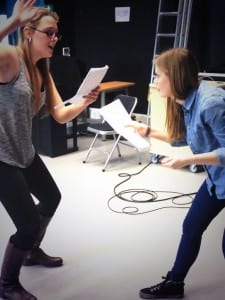 as it is being devised it’s crucial we ensure that our future audience know what they can expect from the production. In rehearsals this week we decided to work on transforming parts of Shakespeare. This transformation of famous text is a crucial element we have used to advertise our piece. With the tagline ‘From Shakespeare to Pitbull’ we are suggesting to audiences there is a complete range, and are using the famous name to attract the public and give our piece some form of context. It has been suggested:
as it is being devised it’s crucial we ensure that our future audience know what they can expect from the production. In rehearsals this week we decided to work on transforming parts of Shakespeare. This transformation of famous text is a crucial element we have used to advertise our piece. With the tagline ‘From Shakespeare to Pitbull’ we are suggesting to audiences there is a complete range, and are using the famous name to attract the public and give our piece some form of context. It has been suggested:
‘Texts are artifacts apt for interpretation’ (Margolis, 1993)
As a company we want to reinterpret text, and have therefore begun to use famous monologues or soliloquys from Shakespeare to form duologues between the plays. Audiences will be familiar with the words from the text and understand it is Shakespeare, however, whether they will grasp its new formation which will be in duologue form and in a new setting will be another matter. This well known text is one of the reasons we have used the image of Shakespeare in our advertising process as well as within our production.
Shakespeare has been placed in our tagline and on our current poster, as you can see below:
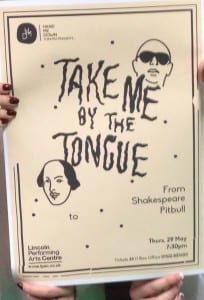
(Take me by the Tongue Poster. Taken by: Kirsty Jakins 9.4.14)
Not only this, but after meeting with LPAC café staff we managed to organise an acoustic night. So far we have advertised this event heavily on social media to spread the word and reach a more student based audience, who are likely to be the ones walking around the LPAC café on a late Thursday afternoon. Through presenting images on these sites we hope to raise interest. The café have previously had acoustic nights also, so if advertised in other areas of Lincoln the previously popular night may be able to work for our company. We are organising leaflets which we will use the week before the event to ensure it is seen. We have also now officially started rehearsals for our acoustic night taking place on the 1st May, where we plan to show our potential audience a little bit about our company. We will be changing more upbeat songs to make them acoustic, representing how we can change how something is first perceived. Whilst this is occurring, to help advertise our show other members of the company will be walking around catching attention and discussing with people what our show is all about. Not only will this event raise awareness for our company with logos for stickers being handed out and act as a teaser, it will also be a potential chance to raise extra funds for our performance ‘Take me by the Tongue’ and allow us to invest in more lavish costume for the piece. Due to its nature we will be changing a lot so extra funds would be extremely beneficial in exchange for song! We feel that by using this event within the LPAC we will not only present our company and what we are about, but also give people a chance to aid our future piece by donating. When it comes to forming an image for our company, this event will hopefully represent what we are aiming to achieve. After all, image is crucial when it comes to marketing our company.
(Acoustic Night Rehearsals. Taken by: Kirsty Jakins 3.4.14)
What’s in a name?
Upon starting the devising process we began to discover the importance a name holds for a piece. We wanted to discover a name for our future performance that reflected both our devising process and ourselves as a contemporary company. In order to gain the most out of our marketing techniques and reach audiences, it was crucial we thought of an enticing title before moving forward with other elements. Levinson tells us ‘titles of artworks are plausibly essential properties of them, in many cases.’ (1985, 29) as they not only entice, but sum up what you want to say. A title can lead to a range of interpretations and spark the initial interest to a project. We had three options for our future performance that we thought could potentially work for our show. These were:
- Interpret this
- Take me by the tongue: Interpret this
- Take me by the tongue
‘From Shakespeare to Pitbull’
After brainstorming these ideas, we then discovered the ultimate importance of market research. The Arts Council, who we would hope to receive future funding from in order to aid other projects, also stress the importance of market research. One of their current research projects includes them trying to ‘improve our understanding of how and why people engage with the arts’ (Arts Council, 2014). This project will enable them to understand who is watching what theatre and fund wisely to future companies in reflection of this. After seeing the importance of this kind of research and its relevance, we ourselves questioned a range of age groups and different types of theatre goers on which title they would find the most appealing. The set of questions we asked and will use in the future when deciding titles are below.
There were a range of initial reactions on aspects of ‘Take Me By The Tongue…From Shakespeare to Pitbull’ more so than others. It seems considering we aim to reach a range of theatre goers in our mission statement, asking a broad group was the most effective route. It was suggested by the younger audience demographic (16-21) in particular that it sounded like a show where they would want to listen to what we have to say, as it is unusual and thought provoking. This is crucial for our current devised piece all about text and interpretation and will be important for future performances also. Many proposed it is interesting enough to grab attention and relates to our mission statement about reinterpreting text, as we are taking others words.
There were the odd few who suggested it could have sexual connotations. After work shopping our piece however, it seems to have developed more feminist connotations. Not only this, but the sexual idea of taking someone by the tongue and their words at the same time works well for our current production. Those in the 35-50 demographic suggested it came across as ‘leading through the power of language’ (Tracy Holland, 14.3.14). These comments from a range of ages represent how important this research can be. As we are open to a wide demographic of theatre goers, questioning a range of people on a name has ensured we chose an effective title where we have sold out our latest show. The fact this title is a lyric from a recent pop song also fits in with our wish as a company to re-contextualise for this particular piece. With good feedback from a range of ages, we decided to go ahead with this title. After such effective and helpful comments, our marketing team will definitely be taking part in this sort of research for all future pieces.
(Above ‘Our company conducting title research’ Taken by: Kirsty Jakins 12.3.14)
Although, the problem with deciding on a title is that your show can change as ‘what makes devising so special is the potential freedom or opportunity to move in a number of different directions’ (Oddey, 1994, 3). You can work on a project for years, such as Michael Pinchbeck’s ‘The Beginning’ and ‘The End’. However, it ultimately develops as I discovered by seeing ‘The Beginning’ in Edinburgh August 2013, then once again in Lincoln a few months later. This is something we have had to and will have to think about carefully, as once a name has been sent out to poster design and venues it is set. Our work has and will change through our devising process, and we will have to work to overcome that with marketing our works titles wisely through creative research and careful planning. To make our current produiction more open in the future, we could remove the tagline ‘From Shakespeare to Pitbull’ to avoid alienating any content.
Works Cited
Arts Council (2014) Arts Audiences. [online] Available from: http://www.artscouncil.org.uk/what-we-do/research-and-data/arts-audiences/ [Accessed: 18.05.14].
Holland, T. (2014) Title Research. [Interview] Interviewed by Kirsty Jakins, 14th March.
Levinson, J (1985) The Journal of Aesthetics and Art Criticism, 44 (Autumn, 1) 29-35.
Oddey, A. (1994) Devising Theatre: A Practical and Theoretical Handbook. New York: Routledge.
Pinchbeck, M. and Hobday, N. and Smith, O. (2013) The Beginning. [performance] Michael Pinchbeck (dir.) Edinburgh: Pleasance Courtyard (Pleasance Two), 18 August.

